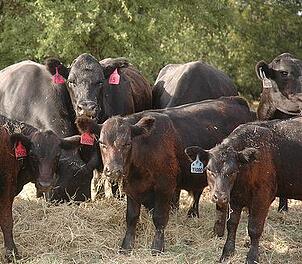 Movies like "Happy Feet" and "March of the Penguins" often remind us of how cute penguins are in the cold, Antarctic conditions where they live. These movies, however, fail to mention another species of penguin that reside in warmer climates and is slowly dying out: African penguins. Although they are on track to be extinct within the next 20 years, the Pueblo Zoo in Colorado and Colorado State University, Fort Collins recently performed cancer treatments on the oldest living African penguin in the world, ensuring that the penguin will be healthy enough to live a longer life. (Image of African penguin (not Tess) courtesy of Wikimedia Commons).
Movies like "Happy Feet" and "March of the Penguins" often remind us of how cute penguins are in the cold, Antarctic conditions where they live. These movies, however, fail to mention another species of penguin that reside in warmer climates and is slowly dying out: African penguins. Although they are on track to be extinct within the next 20 years, the Pueblo Zoo in Colorado and Colorado State University, Fort Collins recently performed cancer treatments on the oldest living African penguin in the world, ensuring that the penguin will be healthy enough to live a longer life. (Image of African penguin (not Tess) courtesy of Wikimedia Commons).
Tags: veterinary medicine, Southwest, Colorado State University, 2015, BioResearch Product Faire Event, CO, Colorado, CSUFC, CoSTU, African Penguin, radiation therapy
In March 2013, construction crews at the University of Georgia, Athens began working on the university's new Veterinary Medical Learning Center. Now, almost 2 years later, the facility is in the final stages of construction and is preparing to open in March 2015.
Read MoreTags: University of Georgia Athens, veterinary medicine, Southern, 2015, UGA, BioResearch Product Faire Event, Athens, GA, new Building
What would you do if you were unable to find a veterinarian for your beloved dog or cat if they became sick? People who serve as caretakers for animals love their pets. The state of Arizona, however, has a shortage of trained veterinarians due to the fact that there is minimal animal medicine programs in the state. One university seeks to address this problem with a new program in veterinary medicine at the University of Arizona.
Tags: 2014, University of Arizona, veterinary medicine, BioResearch Product Faire Front Line Event, Arizona, AZ, UAZ, Research Funding, Tucson, new program
 For both dairy and beef production, cows are an important part of the US economy and food supply. When they get sick, it's bad for business (and not too pleasant for the cow). The most common illness in cattle is Bovine Respiratory Disease (BRD), which accounts for losses of more than $690M annually in the US alone. To combat this threat to bovine health and productivity, the USDA has recently awarded a $9M 5-year grant to researchers at Texas A&M University's College of Veterinary Medicine and Biomedical Sciences, in collaboration with colleagues at the University of Missouri, to study genetic selection for breeding more disease-resitant stock. A second $5M grant will go towards research into feed efficiency, again with the aim of breeding heartier, healthier, and more profitable animals.
For both dairy and beef production, cows are an important part of the US economy and food supply. When they get sick, it's bad for business (and not too pleasant for the cow). The most common illness in cattle is Bovine Respiratory Disease (BRD), which accounts for losses of more than $690M annually in the US alone. To combat this threat to bovine health and productivity, the USDA has recently awarded a $9M 5-year grant to researchers at Texas A&M University's College of Veterinary Medicine and Biomedical Sciences, in collaboration with colleagues at the University of Missouri, to study genetic selection for breeding more disease-resitant stock. A second $5M grant will go towards research into feed efficiency, again with the aim of breeding heartier, healthier, and more profitable animals.
Tags: Texas A&M University, Texas, veterinary medicine, Southwest, 2012, animal science, College Station, TAMU, BioResearch Product Faire Event, Texas A&M Research, Genomics, Genetics, Texas A&M
 The Washington Animal Disease Diagnostic Laboratory (WADDL) within the College of Veterinary Medicine at Washington State University in Pullman is one of an elite group of veterinary facilities that use sophisticated molecular tools to diagnose disease, with labs for bacteriology, parasitology, pathology, serology, and virology. One threat they've been keeping a particularly keen eye out for this summer is West Nile Virus, which they have in fact found in horses, and which led the State to issue warnings for both animals (to have them vaccinated) and humans (to take extra precautions). West Nile is transmitted from infected birds, through biting mosquitos, and on to larger warm-blooded creatures. Because this has been such a hot, dry summer across most of the U.S., birds and mosquitos are finding themselves more often sharing the same rare watering hole, which may be causing the rise in West Nile cases. West Nile is an example of a zoonotic disease, meaning that it can be transfered between species. The role of veterinary labs like WADDL in tracking and identifying cases of these diseases is doubly important, then, as they work to prevent epidemics in our animals as well as ourselves.
The Washington Animal Disease Diagnostic Laboratory (WADDL) within the College of Veterinary Medicine at Washington State University in Pullman is one of an elite group of veterinary facilities that use sophisticated molecular tools to diagnose disease, with labs for bacteriology, parasitology, pathology, serology, and virology. One threat they've been keeping a particularly keen eye out for this summer is West Nile Virus, which they have in fact found in horses, and which led the State to issue warnings for both animals (to have them vaccinated) and humans (to take extra precautions). West Nile is transmitted from infected birds, through biting mosquitos, and on to larger warm-blooded creatures. Because this has been such a hot, dry summer across most of the U.S., birds and mosquitos are finding themselves more often sharing the same rare watering hole, which may be causing the rise in West Nile cases. West Nile is an example of a zoonotic disease, meaning that it can be transfered between species. The role of veterinary labs like WADDL in tracking and identifying cases of these diseases is doubly important, then, as they work to prevent epidemics in our animals as well as ourselves.
Tags: Washington, WSU Pullman, WA, Northwest, New research facilities, Washington State University, veterinary medicine, 2012, animal science, Front Line event, new construction

